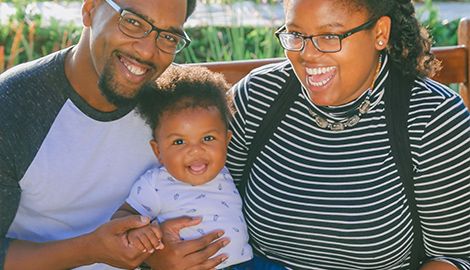The Importance of Healthy Relationships

Raising a child is a journey, but the road can feel a lot smoother when you have healthy relationships. Some of your most important relationships might be with the mother or father of your child, others who share childcare responsibilities, family, friends, and romantic partners.
What is a Healthy Relationship?
A healthy relationship should bring more happiness than stress, should make you feel supported, and should not be one-sided. This means:
- Showing each other respect by understanding boundaries and expecting the same in return.
- Placing trust in each other and giving each other the benefit of the doubt.
- Being honest and not letting resentment build up.
- Developing good communication by telling each other how you feel and what you need.
- Controlling your anger by taking a pause to think about what you want to say and then talking it out.
- Being willing to compromise and understand that you may have different perspectives.
Benefits of Healthy Relationships
Everyone needs to interact with other people. Having healthy relationships can be a source of love and support through the challenges of raising a child. Additionally, children pay attention to how you interact with others and will model your behaviors. Seeing you model healthy relationships can teach your child how to treat others with kindness, respect, and compassion.
Tips for Developing Healthy Relationships
With some patience and practice, you can build healthy relationships. In addition to communicating, being respectful and honest, and trusting of each other:
- Be fair and share responsibilities, such as changing diapers and household chores.
- Support each other's goals (for example, if one parent wants to go back to school or get a new job).
- Apologize when you are wrong.
- Appreciate each other and show it.
- Invest time in self-care and work on feeling good about yourself. If you don’t, it can be difficult to give off good energy and care for your child when you don’t feel okay inside and out.
Negative Effects of Unhealthy Relationships
On the other hand, unhealthy relationships can develop when one or both parents want to make all the decisions or has uncontrolled anger. No relationship is perfect, but if these behaviors are happening often, they can cause you stress and affect your child’s well-being, too.
Helpful Resources
Counseling: Therapy, support groups, or counseling can be a helpful way to learn how to better communicate. Some insurance plans might cover these services. To find services near you, talk to your doctor or find a local health center.
Parenting classes: Parenting classes can be a great way to learn how to work as a team with your partner and to learn from other parents’ experiences. To find parenting, classes talk to your doctor or search Google for free classes in your area.
National Domestic Violence Hotline: If someone is hurting you or your child physically, emotionally, or sexually, we encourage you to seek help. For support, call 1-800-799-7233 or text LOVEIS to 1-866-331-9474. If you are in immediate danger, CALL 911.
Parenting classes: Parenting classes can be a great way to learn how to work as a team with your partner and to learn from other parents’ experiences. To find parenting, classes talk to your doctor or search Google for free classes in your area.
National Domestic Violence Hotline: If someone is hurting you or your child physically, emotionally, or sexually, we encourage you to seek help. For support, call 1-800-799-7233 or text LOVEIS to 1-866-331-9474. If you are in immediate danger, CALL 911.